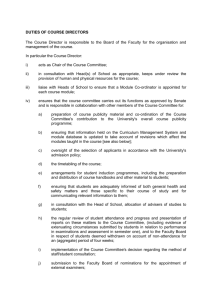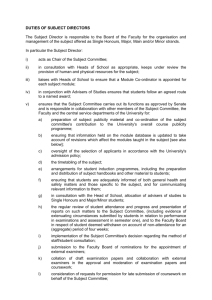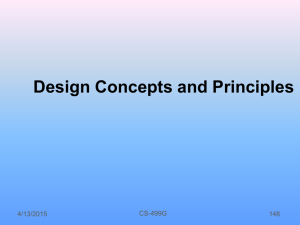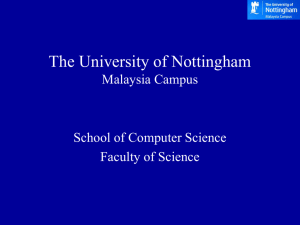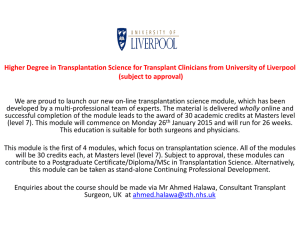UNIVERSITY OF KENT AT CANTERBURY
advertisement
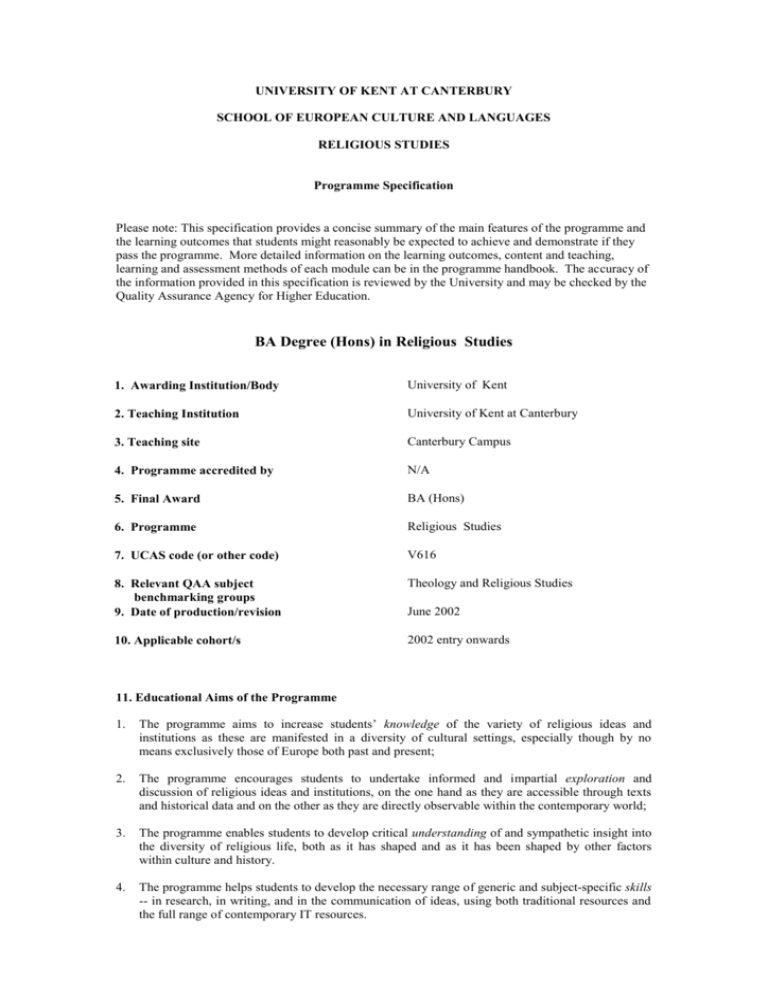
UNIVERSITY OF KENT AT CANTERBURY SCHOOL OF EUROPEAN CULTURE AND LANGUAGES RELIGIOUS STUDIES Programme Specification Please note: This specification provides a concise summary of the main features of the programme and the learning outcomes that students might reasonably be expected to achieve and demonstrate if they pass the programme. More detailed information on the learning outcomes, content and teaching, learning and assessment methods of each module can be in the programme handbook. The accuracy of the information provided in this specification is reviewed by the University and may be checked by the Quality Assurance Agency for Higher Education. BA Degree (Hons) in Religious Studies 1. Awarding Institution/Body University of Kent 2. Teaching Institution University of Kent at Canterbury 3. Teaching site Canterbury Campus 4. Programme accredited by N/A 5. Final Award BA (Hons) 6. Programme Religious Studies 7. UCAS code (or other code) V616 8. Relevant QAA subject benchmarking groups 9. Date of production/revision Theology and Religious Studies 10. Applicable cohort/s 2002 entry onwards June 2002 11. Educational Aims of the Programme 1. The programme aims to increase students’ knowledge of the variety of religious ideas and institutions as these are manifested in a diversity of cultural settings, especially though by no means exclusively those of Europe both past and present; 2. The programme encourages students to undertake informed and impartial exploration and discussion of religious ideas and institutions, on the one hand as they are accessible through texts and historical data and on the other as they are directly observable within the contemporary world; 3. The programme enables students to develop critical understanding of and sympathetic insight into the diversity of religious life, both as it has shaped and as it has been shaped by other factors within culture and history. 4. The programme helps students to develop the necessary range of generic and subject-specific skills -- in research, in writing, and in the communication of ideas, using both traditional resources and the full range of contemporary IT resources. 12 Programme Outcomes The programme provides opportunities for students to develop and demonstrate knowledge and understanding, qualities, skills and other attributes in the following areas: Teaching/Learning and Assessment methods and strategies used to enable outcomes to be achieved and demonstrated Knowledge and Understanding A. Knowledge and understanding of: 1 The place, role and influence of religion and religions in human culture, particularly the culture of Europe 2 The role and significance of religion within human experience 3 The relationship between the study of religion and other branches of the Humanities and Social Sciences 4 The main approaches and methodologies characterizing the critical study of religion and its influences as defined by the secular context of the University outcomes achieved by: attendance at lectures, participation in seminars, module-based study skills sessions, discussions with convenors and seminar leaders, self-directed learning, assigned written work (essays, commentaries, projects, dissertations, group exercises) outcomes demonstrated by: formal examinations and coursework assessment (essays, commentaries, projects, dissertations, seminar discussions, individual and group presentations) Skills and Other Attributes B. Intellectual (thinking) skills: 1 The critical evaluation of empirical data 2 The critical analysis and interpretation of relevant textual resources 3 The critical assessment of alternative theories and interpretations 4 The ability to construct and defend arguments and conclusions in a coherent manner outcomes achieved by: study-skills sessions integrated within particular modules; appropriately designed examination papers, essay questions and other assessment tasks as monitored by colleagues and external examiners; marking system whose rationale and grades are explained to and understood by students; student assimilation of feedback on marked essays and accompanying cover sheets outcomes demonstrated by: quality of written assignments, class discussion and formal examinations; adjudication of written work by and comments from external examiners; formal comments in annual reports of external examiners; informal comments from external examiners C. Subject-specific skills: 1 The sensitive and critical evaluation of religious data within their proper historical and cultural contexts 2 The sensitive and critical analysis of religious texts within their proper historical and cultural contexts 3 The sympathetic appreciation of the ideas and practices of other groups and individuals 4 Development of the ability to articulate the multiple connections between experiences, ideas, practices and institutions in the appreciation and understanding of religion and religions outcomes achieved by: study-skills sessions integrated within particular modules; appropriately designed examination papers, essay questions and other assessment tasks as monitored by colleagues and external examiners; marking system whose rationale and grades are explained to and understood by students; student assimilation of feedback on marked essays and accompanying cover sheets outcomes demonstrated by: quality of written assignments, class discussion and formal examinations; adjudication of written work by and comments from external examiners; formal comments in annual reports of external examiners; informal comments from external examiners D. Transferable skills: 1 The utilization of the full range of traditional research and writing skills (including note-taking, precis skills, bibliographical formatting, etc) 2 The utilization of the full range of computing and IT skills and resources (word-processing, email, WWW, database searching, etc) 3 The ability to communicate effectively (coherently and confidently) with ones peers and teachers both informally and in a variety of classroom settings 4 The ability to work creatively and flexibly, whether on one’s own or with others in a group 5 The ability to manage ones time and resources effectively, especially under pressure (e.g. in relation to fixed deadlines or within the specific constraints of a class presentation) 6 The ability to evaluate one’s own academic and communicative performance, and to learn from the responses and criticism of ones peers and teachers outcomes achieved by: study-skills sessions integrated within particular modules; appropriately designed examination papers, essay questions and other assessment tasks as monitored by colleagues and external examiners; marking system whose rationale and grades are explained to and understood by students; student assimilation of feedback on marked essays and accompanying cover sheets outcomes demonstrated by: quality of written assignments, class discussion and formal examinations; adjudication of written work by and comments from external examiners; formal comments in annual reports of external examiners; informal comments from external examiners; students’ successful completion of the programme 13 Programme structures and requirements, levels, modules, credits and awards The programme is offered on both a full-time basis (over three years) and a part-time basis (normally over six years). Study on the programme is divided into a number of discrete units called modules. Each module is worth a specified number of credits and described as either single-weighted or double-weighted. Single-weighted modules are worth 15 credits and double-weighted modules 30 credits. Fifteen credits corresponds to approximately 10 hours of learning time per week. This learning time is understood to include both contact time with teachers and individual study and research. The programme is divided into three stages, each of which comprises 120 credits. Students must complete a specified number of credits before being able to proceed to the next stage. For full-time students each stage represents one academic year of study. A full-time student must complete 360 credits (120 x 3), this total representing 3600 hours of learning time. Each module is designated at one of three ascending levels: Certificate (C), Intermediate (I) or Honours (H). To be eligible for the award of an honours degree, at least 120 of the 360 credits must be at Level I or above and at least 120 must be at level H or above. In each year full-time students students select modules to the total value of 120 credits from lists of modules classified as required, recommended or optional. In their first year (Part I) students are required to take at least two level C modules (worth 30 credits out of the total of 120) from the list of Religious Studies modules. Prerequisite modules must be passed before students proceed to the second year of the programme. Failure in these modules may not be compensated or condoned. Students make up the remaining 90 credits from the other level C modules available within the Humanities Faculty. In their second and third years (Part II) students take a combination of level I and level H modules, to a total of 240 credits. At least 150 credits must be from Religious Studies modules; up to 90 credits may come from relevant modules offered by other subjects. The structure of the programme and its composite modules are shown in the table below. Year 1 modules Code Title Level Credits Terms Required module TH325 What is Religion? C 15 1 TH300 New Testament Greek for Beginners C 15 1&2 TH331 Introduction to Hinduism & Buddhism C 15 2 TH332 Myths, Symbols & Mysteries C 15 1 TH333 Gods of the Desert C 15 2 TH334 Religion and Sex C 15 1 Optional modules Years 2 & 3 Required module TH553/598 Issues in Religious Studies I&H 30 Optional modules Level TH529 New Testament Language I&H 30 1&2 TH530 New Testament History and Literature: Luke-Acts I&H 30 1 TH546 Cosmology and Divination I&H 30 1 TH547 Religion and Globalization I&H 30 2 Credits 2 Terms TH548 Texts and Traditions in Western Christianity I&H 30 1 TH555 Hindu Religious Thought I&H 30 1 TH556 Buddhism: Its Essence and Development I&H 30 2 TH558 Sociology of Religion I&H 30 1 TH570/TH574 Religion and Film I&H 30 2 TH571/TH575 Death of God?: Christianity and the Modern World TH572/TH576 Theology and Economics I&H 30 2 I&H 30 2 TH577 Christianity and Ethics I&H 30 1 TH578 Psychology and Religion I&H 30 1 TH579 Science and Religion I&H 30 1 TH580 Religion and Story I&H 30 2 TH581 Gurus and Disciples I&H 30 2 PL522 Greek Philosophy: Plato and Aristotle I&H 15 2 PL528 Philosophy of Religion I&H 15 2 CL578 Myth into Tragedy I 30 1&2 PL534 The Self and Authenticity H 15 1 PO576 Classical and Christian Political Philosophy H 15 1 HI710 Franks, Vikings and the First Reich: the History and Culture of Medieval Christendom from Charlemagne to the First Crusade Year 3 I&H 30 1 Required Modules Level TH515 Theology and Religious Studies Dissertation H Optional Modules from other departments Credits 30 The above list of modules is subject to change year by year 14 Support for Students and their learning Part I and Part II Handbooks issued by Faculty Subject leaflets and module booklets issued by RS section Personal academic tutorial support throughout degree programme Library tours at start of year; library helpdesk and support throughout year Study skills pack issued to students from UELT supported in individual modules Staff-student liaison committee (with representatives from each year) Dedicated email discussion list for RS students (rs-info@ukc.ac.uk) Terms 1&2 Learning resources: subject library provision, computer terminals throughout campus, Internet access in student accommodation, full use of IT resources in teaching, web pages supporting specific modules, material issued to students on CD-ROM in selected modules, programme of documentary films integrated into teaching timetable Academic support system providing advice on module choice, programme structure, academic difficulty, progression routes and individual progress. Campus support services, including a Student Learning Advisory Service, a Part I senior tutor, a Student's Union (including an Advice and Information Service and Student Development Unit), a Careers Advisory Service, Counselling Service, Medical Centre. 15 Entry Profile Entry Route For fuller information please consult the University prospectus Minimum Requirements Standard entry requirements: A levels and AS levels Alternative modes of entry: University Certificate or HND You must be at least 17 years old by 20th September in the year you begin your programme. There is no upper age limit. 5 GCSE passes, including English Language or Use of English, and at least 2 subjects at A level. See Curriculum 2000 for details of our minimum requirements for the new AS levels tariff 240/280 points at GCE A level. No subjects are required, but we may ask for grade C in Religious Studies A level where taken Completion of a Certificate or Diploma course, e.g. Certificate or Diploma in Theology offered by SEITE What does this programme have to offer? A degree programme concerned to give students an overall understanding of the nature of religion and of the issues informing the study of religion and religions An emphasis on the relationship between religion and other aspects of human ideas and culture, with the opportunity to integrate modules from other programmes into a single-honours RS degree and to combine RS with other subjects in a joint honours degree. A friendly campus with high student morale and friendly and dedicated teaching staff (who in recent teaching quality review achieved top marks for Teaching, Learning and Assessment, Student Progression and Achievement, and Student support and guidance The opportunity to live in or near Canterbury, which offers a good combination of the urban and the rural, and which is ideally placed within easy reach of London and near the SE coast of England Personal Profile Applicants should have: A desire to acquire a critical but sympathetic understanding of the religions of their own and other cultures A desire to develop an informed and critical sense of the differences and similarities between world religions past and present A willingness to situate the specialist study of religion and religions within the broader framework of academic studies in the Humanities and Social Sciences A recognition of the importance of primary source material, whether literary, historical or sociological An awareness of the need to develop and apply critical methodologies, whether linguistic, textual, literary, historical or scientific An ability to develop and present their ideas clearly and coherently in a variety of written and computer-based formats A readiness to share their enthusiasm and ideas with their fellow students and with society at large An openness of mind, a curiosity about life, a thirst for knowledge, a capacity for self-reflection and a desire to be intellectually independent. 16. Methods for evaluating and enhancing the quality and standards of teaching and learning Mechanisms for review and evaluation of teaching, learning, assessment the curriculum and outcome standards Student evaluation questionnaires from each seminar group within each module Annual Monitoring Reports (which include reviews of progression and achievement statistics) External Examiners' reports Periodic Programme reviews Annual staff appraisal Active staff development programme Peer observation Mentoring of new and part-time lecturers QAA subject review Continuous monitoring of student progress and attendance Personal Academic Support system Vetting of examination questions by subject examinations board and external examinars Committees and bodies with responsibility for monitoring and evaluating quality and standards Departmental director of learning and teaching Departmental learning and teaching committee Faculty learning and teaching committee University Learning and Teaching Board Programme Approval sub-committee of the University Learning and Teaching Board Board of Examiners External Examiners attending Board of Examiners External Examiners’ Reports Departmental staff acting as external examiners at other institutions Double marking or moderation of all assessed work Evaluation of graduate destination statistics Monitoring of part-time teachers Staff-student liaison committee Departmental graduate studies committee Departmental quality assurance committee Mechanisms for gaining student feedback on the quality of teaching and their learning experience staff-student liaison committee student module evaluations Discussions with tutors (including staff office hours) Discussions with senior tutors informal meetings and social contact with students (including student role in recruitment activities) student representation on subject meetings and departmental committees student representation on faculty committees student representation on university committees Staff development priorities include Peer observation Research-led teaching Part-time lecturers encouraged to enrol on the Associated Teacher Accreditation Programme Regular formal and informal collaboration in programme development Staff appraisal scheme Research seminars Subject-based conferences Mentoring of new and part-time lecturers Conference attendance Professional body guidelines Widening participation Health and safety Dissemination of good practice on new learning and teaching methods 17. Indicators of quality and excellence Independent review by the Quality Assurance Agency in February 2001 of the quality of education provision by Religious Studies in the school of European Culture and Languages Positive evaluation of programme by current and former students formally and informally Significant numbers of students progress to further qualifications and postgraduate degree work (e.g. PGCE, MA by coursework and dissertation, MA by research, Mphil, PhD). Profile of student achievement (degree class in relation to qualifications at entry) High proportion of former students in employment The following reference points were used in creating these specifications Benchmarking statements for Theology & Religious Studies http://www.qaa.ac.uk QA Review Report: http://www.qaa.ac.uk [complete ref] The University Plan and Learning and Teaching Strategy, and the University mission statement http://www.ukc.ac.uk/ University of Kent Undergraduate prospectus and subject leaflet for RS Faculty Part 1 and Part II student handbooks Peter Moore 20-09-2002 Revised 09-12-2005 Chris Deacy Revised 16-11-2010 Professor Jeremy Carrette

